|

A nearly-frozen Kentucky creek.
(*photo credit)
January 1, 2012 Give Global Peace a
Chance
The
modified refrain from a vintage 1969 song hums in the background of our
war-tired world. Peace calls out to be heard, and yet it seems unattainable.
However, our world longs for peace at the start of 2012, and what seems
impossible could be attained with the right willingness. Military readiness and
activity saps our precious resources that could go for more beneficial
activities. On this Day of Peace when we celebrate a holyday and a Sunday all
wrapped into one, we recommit ourselves to peace; we pray that we can become
willing peacemakers. Look at the places:
Afghanistan/Iraq
withdrawal -- Why continue these expensive and disturbing military actions?
The two wars have become the longest in American history and are verging on the
costliest as well. It is time to break away and let these countries handle
their affairs.
African
assistance -- A multitude of Africans suffer from the vast inequalities of
our world -- lack of food, health, housing and jobs. A "Global Marshall Plan"
geared toward that continent could overcome the differences among nations and
assist small farmers, focus on employment infrastructure construction, and on
health and education improvement. Africa needs roads, railroads, seaports,
airports, clinics, schools and virtually every physical facility for a better
quality of life. Much economic resource leaves the lands through corrupted
leaders (one trillion dollars slips out to tax havens elsewhere) or never comes
to the people through unfair oil, gas, and mineral revenues.
Middle
East peace -- Why do we tolerate continued settlement building in the West
Bank while calling for Israeli and Palestinians to get together? Is it like
asking two unequal people to come together voluntarily, as though both are
equally able to make such decisions? Something horribly disingenuous exists
before our eyes, and we Americans demand that both parties take equal measures.
Human
rights championing -- A fourth global area is that of minorities in such
places as Tibet, among Coptic Christians in Egypt, and tribes on the border of
the new republic of South Sudan. It is right that our State Department
continues to make demands for the rights of minority peoples throughout the
world.
Nuclear
weapons banning -- Calling for the ban on nuclear weapons and also on the
"peacetime use of the atom" for electricity generation could go a long way to
removing a potential danger from the face of the Earth. Last year concrete
steps were taken between the U.S. and Russia and these need to be accelerated
and include all countries.
Prayer:
Lord, inspire us to be primary peacemakers in this year. Help us see that
inadvertent promotion of a military/ industrial complex in this land and abroad
is utterly destabilizing and threatening to world peace.

Dried teasel growing near old, abandoned home site.
(*photo credit)
January 2, 2012 Predicting
30 Trends: Is this a Good Exercise?
Perhaps the village drunk is
as good at predicting the course of 2012 as is the Nobel price economist. They
both will get fifty percent within a margin of error. Realizing this makes me
hesitate to engage in predicting. However the practice holds out the hope that
the unpredictable will mean better times. So reasoning that way, here are my
2012 environmentally-related predictions (not including the politics of the
U.S. or global economic conditions):
* No comprehensive climate
change treaty will be signed.
*
Global carbon dioxide emissions will show a slight decline.
*
Wind will be the leading energy source in expansions.
* Natural gas will be a
growing part of the global energy mix.
* Nuclear power as part of total energy
mix will decline.
*
Global coal production will remain steady and emissions per unit burned remain
the same
(powerplants will open and close).
*
Oil surpluses develop and prices at the pump decline.
* Deep-water drilling will
increase overall.
*
Global efforts will seek to reduce nuclear stockpiles while worries about
Pakistan's weapon's
security will increase.
*
Shale formation fuel sources in Israel will prove promising.
* Biofuels from food crops
will show a slight decline.
*
Solar energy price per watt will dramatically decline.
* World food prices will
rise especially among staples.
*
World hunger will continue at a worrisome level.
*
Over one million (especially infants) will die from hunger.
* Food wastes exceeding
global hunger needs will continue.
* Oceans will rise and
glaciers shrink.
* Polar ice cap will
continue to decline in summer and trade route through Northwest Passage will
gain a few days.
* Whales will continue to be
harvested for "research" purposes and excessive sharks continue to
be fished for
shark fins.
* Polar bears will suffer
declines.
* Asian middle class will
expand by five to ten million.
* Electronic books will beat
paper ones in numbers produced.
*
Reforestation will gain momentum in parts of the world.
* Annual storms and severe
weather will exceed 21st century average in frequency.
*
Meat and animal products consumption will reach high mark.
* Anthropogenic
global warmer deniers will decline in number.
* Outrage over environmental
issues will increase.
* Broadband access will
continue to rise.
*
Social contact will encourage increasing numbers of protestors in cities and
towns
throughout the world.
Note:
While some of these informed guesses will be straight forward next New Year's,
still others will await final tabulations that may not be known for several
months into 2013. So we will not have a listing of our success in prediction on
January first.
Prayer:
Lord, give us this day a sense of what is coming, and the energy to help shape
our future with a sense of hope.

Enjoying a Kentucky winter sunset.
(*photo credit)
January 3, 2012 Election
Year and Hidden Marks of Leadership
It
is election year again and we have the primaries here staring us in the face.
What do we expect of a leader? George Washington was regarded as a leader from
the beginning of his generalship in 1776. On the other hand, Abraham Lincoln,
though a leader, was heavily reviled throughout his tenure of office. Instant
recognition is not an essential characteristic, even when candidates for office
show hidden qualities. While religion and patriotism are presumed public
expressions, let's focus here on hidden characteristics that we might detect in
candidates:
1.
Enthusiasm means the God within. Is the candidate inspired and inspiring
for enthusiasm must be contagious? For us who really suffered under Reagan, we
still admit he could arouse people. Some current candidates will not motivate a
goldfish.
2.
Commitment means that candidates have specific agendas and, if they
change, they do so on principle; they do not look over their shoulders at
pollster numbers, but choose and hold causes on principle -- even though some of
us voters differ in specifics.
3. Realism is expressed
in manner of response to questions and ways of presenting a cause. Those who
promise to do better than someone else may or may not, and we have to be
discerning when it is difficult to predict what future leadership will demand.
4.
Sincerity is a quality that is overlooked because we are so fooled by
surface glamour and glib conversation. At least it is good to watch the
personal response during debates or when winning or even better when losing
contests. Sincerity shines through.
5.
Respect is a hidden virtue that goes against the grain of a
self-promoter, who is tempted to demote others in order to raise oneself.
However, successful candidates must respect the dignity of others; this is done
through a basic diplomacy that is able to bind people together for common goals
and a sense of purpose.
6.
Radicalism means getting to the roots of problems. Beware of glib
speakers or those who say the expected thing. Do they show deep enough
knowledge of general history and world affairs as well as of local issues.
7.
Motivation is that hidden aspect that is so hard to interpret. Come to
know the financial resources and the friends of the candidate, for these give
hints of what is the motivation behind certain viewpoints and actions.
8.
Openness to change and new ideas may be hidden, but observe the manner in
which campaigns are run and emergencies treated. Leadership rests with the ones
who can do these things well.
Prayer:
Lord, open our minds and hearts to choose well, for from our democratic choices
must come tomorrow's leaders.
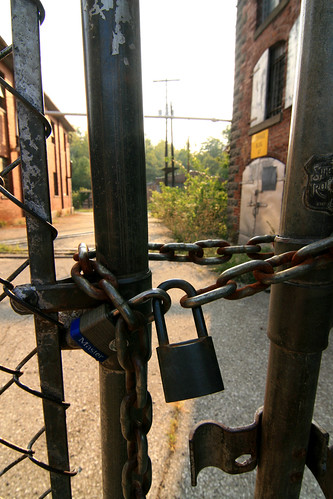
Old Taylor Distillery gates. Millville, KY.
(*photo credit)
January 4, 2012
Indebtedness: A Crime Against the Future
A
few years back an Appalachian activist decided to start up a non-profit
organization. It seemed a spur of the moment decision and so I asked him how he
intended to fund the new group. He said, "I have a credit card."
Unfortunately, he was anticipating that sometime in the nebulous future some
benevolent donor would rescue the group from its debt. It was incomprehensible
and so the life of the organization was very brief to say the least.
This
may raise a question as to whether a failure to prepare for the future is a
serious misdeed or simply an overlooked foible that can be dismissed. Expecting
a future sugar daddy to pay for present extravagance does seem somewhat
irresponsible. Some people incur debts that may never have a hope of being
repaid, and so the condition is one of inevitable bankruptcy. In the last few
months the credit-card-now-and-pay-later mentality is not something limited to
individuals in our society. It is a way of thought for entire communities or
nations, and there is little that restrains such behavior except limits on an
ability to get into further debt.
Few
regard such deliberate indebtedness as wrongdoing, much less criminal action.
Of course, much depends on the manner in which personal debts were incurred, for
often these debts are the result of mishap or unexpected illness. However,
sometimes the "good name" of the person's credit-worthiness led to debt. In
other cases the debt is for an education -- that does not guarantee a good
enough job to repay the debt in reasonable time. Forgiveness of such debts
ought to have higher priority than bailing out banks. Sometimes debts are
business investments with debtor expecting to repay the lending agency in proper
time.
What
about spending beyond one's means through sheer failure to plan for the future?
"Let the descendants take care of it for I will be gone before the bill comes
due." In some way, this is what governmental debts are all about. A crisis
will occur but that is beyond one's lifetime -- and nothing matters beyond such
a selfish one's death. In such instances debt is a denial of responsibility for
the future -- even a future when those saddled with debt will curse the ones who
made it in the first place.
For
fiscal conservatives deepening debts are incomprehensible; it is simply putting
off for others what must be considered today's heartaches, difficulties, and
duties. Leaving debts does not endear us to future generations. Love demands
respect for those living and those to come, whether neighbors here and now or
future people out there and then. However, we know that some debts are not
going to be repaid and so the consequences of a default loom on the horizon and
is regarded as a good way for a fresh start. Bankruptcy and default, if
properly managed, does promote new beginnings.
Prayer:
Lord, give us a sense of responsibility and a resolve to leave the scene in a better
condition than how we found it.
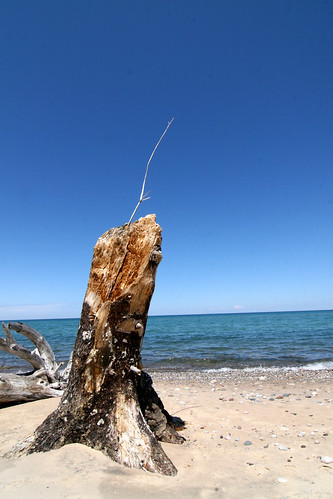
Winter blues. St. Ignace, MI.
(*photo credit)
January 5, 2012
Academic Contributions (Credits and Debts)
Ought
we to question the current academic institutions and ask whether they are really
worth it? Often in current news reports audiences get an impression that
intellectual life rests solely within these august and expensive institutions of
learning, and that outside ivy walls few meaningful thoughts occur. Some accept
that scattered entrepreneurs and executives can think, but for the greater part
academic centers are springboards of people meant for meaningful contribution to
the current system. The subtle message is clear to and from institutional
donors: "Whatever you say, do not rock the boat in these turbulent and stormy
waters."
What
became startling in the American "Arab Spring" is how far removed academic
institutions are from radical thought -- and this tells us something. Those in
academics risk their occupation if they are on the front lines of change. The
funders of expensive institutions do not like activists in the midst of the
hallowed walls upsetting a rather stable establishment. Granted, teachers do
not like students diverting time from precious studies, and administrations
expect the same from teachers. I asked one administrator to support one of my
causes, and he said his school would not dare allow him to do this. Such is
academic life!
This
raises the question of high costs of education and the massive funds needed for
top research, extensive athletic programs, high-priced coaches, beautiful campus
buildings, and all the paraphernalia associated with roaring arenas and noble
prize winning centers of learning. Is all that really worth it? Are the
students and beleaguered parents caught in this academic hype by forking out
thirty to fifty thousand dollars a year for what could be learned by attending
lectures on the Internet or for free? Is it time for academics that is offered
free of strings? Is it not the situation in which a "free university" could
flourish even without the credentials and recognized degrees?
A
highly mobilized public relations department in every academic institution tells
of the glory of that place; the agency explains why funds paid for tuition and
lodging in swank places are all worth student indebtedness. However, a debit
side exists: the ivy walls are the barriers against profound change that must be
entertained and voiced in a dysfunctional and materialistic society.
Unfortunately, as in this very society, the debits far outdistance the credits
and will only be paid on the backs of a future generation. Yes, credits do
include some forms of innovation, but many occur apart from the academic hype in
simple garages (yes, Steve Jobs) and hidden research facilities often cloaked in
trade secrecy. All too often innovative occupants either rejected academic hype
or had to be retrained later in life.
Prayer:
Lord, help us to keep from pretending, but rather to see the simple things in
life, and to recognize the meaningful work of others no matter what their status
or academic credentials.
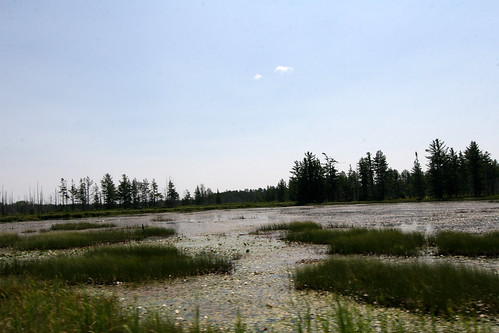
Hardly a cloud in view.
(*photo credit)
January 6, 2012 Are
Americans Supposed to be the Greatest?
Hubris
blinds a person -- and perhaps a nation as well. Even if the United States was
the 20th century superpower, must this continue? Is this land to be greatest in
what? Car population? Size of housing per person? Length of super highway
systems? In compiling this listing we find that in everything from power plants
to electronic devices the U.S. is ceasing to be number one in production and in
utilization. China with its fourfold larger population is running ahead of the
U.S. (and Canada added in when referring to North America). Surely greatness
has to be based on more than material items and resource use. But even in
education or health quality to social and financial equality others nations
seem to be slipping into number one spot.
Traditional
national greatness is more a perception of exceptionalism from which the
justification of privilege of one type or another is based. Perceived greatness
was a lesson we learned from those colonial-minded European ancestors who came
to our shores over the last half a millennia. It has a tinge of being chosen
for a special mission; it included a justification of placing others in the
status of servitude or even slavery; it involved senses of power and control
based on army and navy might and scattered global military bases. It even
included the impunity to enter another's sovereign space and assassinate someone
who was marked as "a terrorist." Greatness and privilege went hand-in-hand, and
raised the ire of others while we overlooked the seething anger of those
subjected to our might and overhead drones.
Some
of what has just been said makes patriotic people resentful and say, "But our
security has been at stake." But in a longer view maybe we ought to ask,
whether our perceived greatness and its preservation might have become a cause
of insecurity, and that true greatness could perhaps rest in another measure,
namely, to be the first to share resources with the underprivileged of the
world. A spiritual form of greatness has been absent from the political
discourse of the upcoming elections in November. Isn't it time that some
endeavor to talk about sharing resources with the needy, and that the greatest
security in the world in which we live is the health of Africans? We hear
candidates of both political stripes tell why we must continue our role as
"great" in the most unrealistic and selfish manner.
Besides,
isn't one nation per century enough for the limelight? Wasn't one American
century enough for a time? However, we need not abandon the global scene.
Rather let us be the first to redefine "greatness" in spiritual terms, something
that even materialists in emerging nations overlook. Let's be first to feed all
the people, give health opportunities to all, liberate prisoners, and share
resources with the disadvantaged.
Prayer:
Lord, give us new insight to see that if we are to be great, let it be in
service for others; help us to expand freedom and equality, and thus be faithful
to our founding ideals.
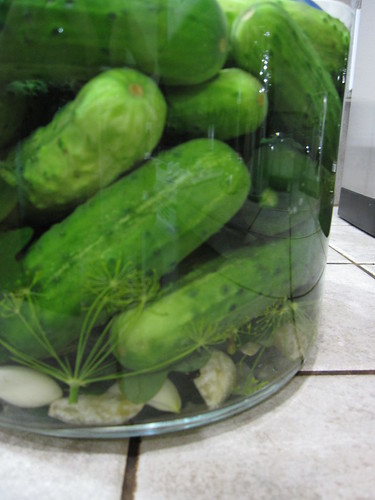
Sour pickles, in the works.
(*photo by Shannon Henry. Creative Commons.)
January 7, 2012
Welcome to the Vinegar-Loving, Sour-Pickle People
One
observer asked me, "Are you really so short of new topics that you resort to
sour pickles?" How about raw sauerkraut, pickled pigs feet dashed with
horseradish, old-time damson plums, or cheaper red wine? I always wanted to
write about sour pickles and other such delights, but now have the nerve in old
age.
Lovers
of sourness are so few in number that we risk being marginalized or regarded as
requiring counseling due to distorted taste buds. One of my relatives confided
half in secret that her little three-year old loves sour things, and would take
a pickle over ice cream. I said that it is okay; I often cover ice cream with
slices of pickles. I confided that if the little one is not simultaneously
favoring sweets, she may never have an obesity problem; of course when she
favors pickles for dessert, she must be prepared for ribbing by those with
culinary intolerance.
Yes,
I began this by eating a sour pickle from my collection that I would share with
others, except most wince at the sour taste, and ask for a dose of honey or
molasses. A small number of us in this world (I suspect less than one percent)
love sour pickles, and the sourer the better. Forget the "sweet and sour" sugar
additions. Keep it straight vinegar -- a godsend for the world of sourness, but
be careful, for too many sour things undiluted could wear away the enamel from
your teeth and solely sour things may upset the digestive system.
Attention
vinegar lovers! Moderation in everything is utterly important, even those
tempted to swig unadulterated (non-aqueous) vinegar. Please, cut all drinks
with water, even non-intoxicating ones. However, continue to look for a
multitude of ways of making the vinegar more enjoyable with a host of herbs that
you or friends grow -- and to list all that could be used (it would take the
remainder of the page). In fact, just about any edible herb or herb combination
could be added to make a fine, special tasting vinegar that can be used in
soups, salads, meat and fish stews, and other dishes. Promote vinegars as a new
enterprise worthy of economic embellishment in an age seeking new job
opportunities.
----------------------
Note:
In December, without fanfare, I suggested that my fourth year of food varieties
(after 365 soups, 365 salads and 365 oatmeal preparations) will be 366 ways
(leap year, you know) to make herbal vinegars. However, the prospect of
creating all those vinegars is daunting, and so the 2012 variation cooking is
broadened to include the use of vinegar in cooking; this gives a wider
variation and the goal can be met more easily. Again, even among you more
moderate sour pickle lovers, suggestions are welcome.
Prayer: Lord, allow your
creativity to rub off on us. Acidity has its place in the universe in so many
ways from fermentation to photosynthesis, so let at least a few of us celebrate
it on occasions.

Planted narcissus blubs bloom in winter.
(*photo credit)
January 8, 2012 The
Privilege to Relinquish Privilege
The
feast of Epiphany is when we celebrate a Messiah for us all, not just for the
chosen people, and we celebrate being included and thus being privileged in a
general way.
Letting
go of what we held as infants and children and teenagers and middle aged is all
part of life. Often what is given up is the privilege of the younger or more
immature lifestyle for something of greater responsibility for and to others.
Privileges of status, or perks, or foods, or treatment are relinquished for a
greater good. In essence, we can understand this in unselfish ways of acting as
individuals, but does this not also apply to groups of people and even nations
and cultures? Does maturation involve abandoning privileges at a national level
for a global body?
The
greatest form of exceptionalism that is wrecking our world, robbing our
resources, and heightening pollution levels is that of indiscriminate use of
resources. If one has the power of the dollar to buy whatever one likes (it is
never satisfying), then acquire all the more and more of the "playthings of
life." The next innovative device must be acquired to keep up with the
neighbor. This feeds on a consumer culture that grows to the profit of a few
and the dreams of the have-nots. Material privilege is the goal of many
emerging, immature, and greedy people seeking to imitate the other richer greedy
folks in the world.
The
challenge for us all is to show that it is a privilege to give and not just to
receive. From Jesus we learn that the privilege of service done in love is a
godly act that makes us deeply happy in this life and in an eternity as well.
Thus, those who have little and are happy in giving refute the prevailing
attitude in our consumer culture: "the more materials the better." On the
national level, a quest for less material benefits could divert attention to
people with essential needs. Fair taxes on the wealthy opens the doors for
financial resources for expanded health care that is a global security issue. A
new development is to focus consumption patterns on satisfying the needy of the
world, a major undertaking of immense proportions and potential benefits.
A
peacetime dividend, a feedback loop of benefits will result. The act of being
willing to relinquish is the trigger to starting a contagion of good, but a
people committed to less materialism must lead the way or else it will never be
done. Those who see the privilege of relinquishment of material things
can see the benefits that could accrue on a national and global level, and that
these actually work to the betterment of a world in turmoil. Yes, spiritual
benefits result for all. We break the chains of disparity of resources. We are
called to be wise people bringing gifts to the Jesus of the struggling world,
and in so sharing we gain global solidarity -- a privilege for us and those we
serve.
Prayer:
Lord, make us wise in giving our treasured gifts to the helpless babes of this
world and all live together in peace.

An unusual mailbox.
(*photo credit) January 9, 2012 Support
the U.S. Postal Service
We
post a letter and send it great distances. We take for granted this service
along with the regularity of the postman or woman. In rural areas of our
country we find this service is of great and often unspoken value; many postal
deliverers serve as a civic connection, a buddy system for isolated elders and a
pre-alert for the immobilized. The one who discovers mail piling up generally
notifies authorities to investigate a dwelling -- and this is a valuable service
that glues our country together.
Reduced
mail volume places our Postal service in danger of defaulting, since it runs as
a semi-private entity with strong governmental requirements and corporate
demands. Efforts are being made to keep the Service solvent and functioning in
this age of electronic mail and reduced hand-written letters and greetings.
Proposals for solvency have included issuing postage stamps; the U.S. Postal
Service realizes that stamp collectors add tens of millions of dollars to the
coffers buying colorful commemorative stamps. Will turning to living people
cause controversy as to selections? Further attention has been given to
limiting service by cutting Saturday delivery that may not be a major
inconvenience for many. However, cutting down the number of post offices, even
though many of these are social centers for certain communities will take a
toll. Relocating offices to business establishments as practiced in Europe with
great maintenance savings is one option.
"Snail
mail," as it is pejoratively known, has certainly taken a major hit in the past
few decades through the emergence of electronic mail, cell phone, Facebook, and
Twitter. Social connections avoid the post. Certainly the desire to be
connected has many benefits. However, failure to answer that same day is
regarded by some as virtually rude or inconsiderate -- or implying that the
person is so deathly sick that 911 must be summoned to a residence. As one who
is cell phoneless, I regard instant response as a burden even when trying to
oblige quickly by email.
The
often overlooked benefits of posted letters is that these are concrete records
that can be filed; they are more private and confidential than emails; they are
written with more forethought and omit rapid and often abrasive responses; and
they allow the time it takes to reflect on the full meaning of contents. A card
or simple letter of greeting, celebration, or condolence means so much to many
of us, and especially to those who find computer communication more difficult
with older age and illness. The theft of personal information on the Internet
becomes a matter of concern that the dependable (but not perfect) Postal Service
can boast of safeguarding to some degree. The further advantage of a satisfying
service occupation for tens of thousands of our citizens must be regarded as a
benefit in this age of high unemployment. Let's hope we continue having the
U.S. Postal Service.
Prayer:
Lord, allow us to see advantages of rapid communication, and to use ways to make
our bonding stronger.
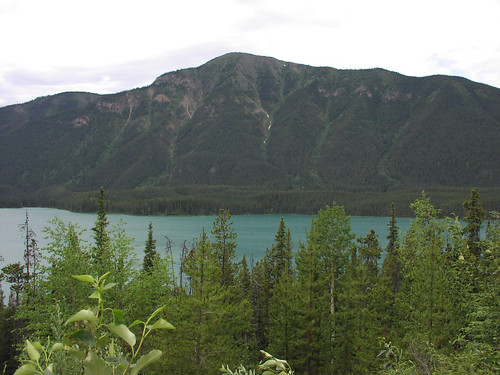
The Canadian Rockies.
(*photo credit)
January 10, 2012 Is
Israel America's Spoiled Brat?
The
title is not the invention of this author but the public statement made last
year by the prime minister of Turkey; this was made after Israel's naval forces
stopped a Turkish ship attempting to carry relief supplies to people in the
cut-off Gaza strip. However, "brathood" does raise questions that need
addressing. First, the title is offensive and pejorative; it causes offense in
Israel and among that nation's supporters in the United States and maybe
elsewhere. However, such dramatic terminology can be a wake-up call to people
who are privileged to get what they want through the patronage of a mighty
protector like the United States. There also may be truth to it, if the
favoritism is so great that it leads to actions not acceptable by a larger
global community.
Revealing
an unfortunate condescension to a nation that has not stopped an inappropriate
action may be acting responsibly. If that country expropriates land and builds
on sites in a densely populated West Bank inhabited by Palestinians powerless
before the might of Israel, then something must be said openly -- tough love
calls for it. In this sense, the favoritism of a financially and militarily
all-powerful U.S. exceeds the limits of a "special" relationship that protects
the vital interests of the protected nation. Weak children need protection if
bullies attack them on the way to or from school; however, children who damage
property on the way to or from school may feel privileged but neighbors may call
them "brats." Does Israel deserve such a designation?
The
title may be more directed at the spoiler than the one spoiled. Granted, some
in Israel believe they have a right to take over the West Bank with little or no
provision for the peace and security of the current inhabitants. This more
fundamentalistic view of occupation for convoluted reasons may be championed by
fundamentalist American Christians. Spoiling another is never good policy. Why
ought we to appease vocal elements in either Israel or in our country when the
nation perpetuates misdeeds to unfortunate neighbors? Our scarce financial
resources need to be conserved. No one has a "right" to something, even living
space, without the responsibility to enjoy a peaceful and just life with the
neighbor with whom he lives. The responsibilities of Israel to its neighbors
are as important as its right to security. The threat of removal of financial
ties is a possibility. No more funds, if you act improperly. Friendship
sometimes makes demands on all parties.
--------------
*
A note on a previous reflection: Ideally, I still believe in a
"one-state" Holy Land solution but in the practical order one must concede to
the two-state solution -- due to current Israel expansion projects that go on
with strong Palestinian opposition.
---------------
Prayer:
Lord, help us to heal our wounded Earth by talking of rights and
responsibilities on the part of all parties. You made Israel a privileged and
chosen people -- and to some degree their mission continues. We are called to
help them fulfill that mission in fairness to all neighbors.
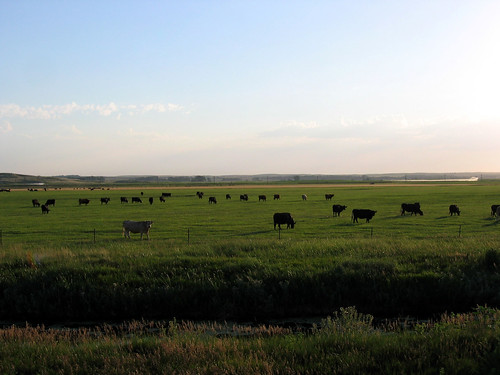
American pastureland.
(*photo credit)
January 11, 2012
Approaches to Pro-life/Environmental Protection
The
upcoming election could be a very crucial one; the voter is reminded that single
issues are not sufficient to base the eligibility of a candidate for elected
office. The following are several types of voters and their approaches that are
worth considering at this time:
Non-involved
Position: This person holds that no issue is of major concern, or that his
or her personal concerns such as health or job security are number one and civic
participation is of little importance. The state of responsible citizenship,
especially when it comes to candidate choices in the coming election is ignored.
Partisan Left-Wing:
This person is pro-choice with no time to hear the pro-life issues that are
dismissed as socially conservative. Perhaps the person sees no connection
between pro-life and a pro-environmental stance. In fact, on some pro-life
matters there may be agreement such as anti-capital punishment and
anti-militarism and Afghanistan War, as well as a favorable stance to addressing
poverty in this world and confront the problem of disparity of wealth.
Partisan
Right-Wing: This person is pro-life with emphasis on the anti-abortion issue
and social concerns such as protection of the end of life issues. However, this
person has developed or uncritically accepted a political anti-environment
stance and is led to believe that there is no or little human causation for
climate change. This person may or may not extend pro-life to include just
treatment of prisoners, war and peace issues, and anti-capital punishment
policies.
Latent
Partisan: This person is silent on either the pro-life issues but vocal on
environmental protection, or silent on environmental connections and vocal on
specific pro-life issues. In any case, Abraham Lincoln's remark, about silence
when we must speak is equivalent to being a coward, is a propos. Such
persons may not want to be too deeply involved in issues that may result in
controversies or domestic political debate and so holds his or her silence in
this election year.
Seamless
Garment Position: This person accepts that environmental protection is a (or
the) pro-life issue (see December 15). This person may begin to side with this
stance, if and when it becomes politically feasible or when they are convinced
that the position is solid, as many independent pro-environment or pro-life
voters would hold. One caution is the chameleon who says something to one
crowd and another thing to another so as to please all parties -- provided the
talks are not recorded.
Prayer:
Holy Spirit, inspire each voter to be conscientious on all issues whether social
or economic, and to be prayerful in the selection of the best candidate for
elected offices in the upcoming election.
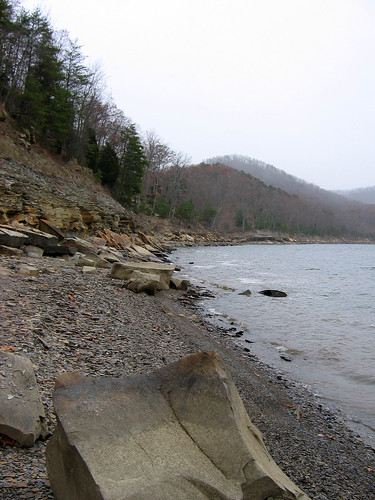
Cave Run Lake, KY.
(*photo credit)
January 12, 2012 HERE
Is Where We Act as Earthhealers
In
many of these reflections over the years we have spoken of HERE meaning
our locality, our place of residence and other aspects: its people, its culture,
its social and political structure, its environment with its flora and fauna,
and its climate and all good things so related. My environment differs from
that of people in other places, a relativity which makes what I say somewhat
different from others. This "hereness" specifies my emotional life, my outlook
on the world around us, and even the way I praise and thank God for the gifts I
perceive. All creation has a special meaning for me that is unique in many
ways.
Act
Locally. The original concept as described two decades ago in "Down to
Earth Spirituality" was that we must appropriate our place; we do not expect
outside gurus to define the environment for us. We discover specificity and
thus our environment has a local flavor demanding that we act in this place, and
that our local neighborhood show responsibility for the limited resources we
have at hand. Here we find our meaning and discover our shortcomings; here to
the best of our power we start the process of healing what has been damaged.
Show
respect by practicing stewardship. The basis with good local citizenship is
that we learn to share resources, and not use them in a selfish manner, for such
is disruptive of the local environment. Generally, the tyranny of personal
greed leads to excessive consumption or a lack of sustainability in such
matters. Our responsible local actions must be those of a wise steward, for
these gifts are HERE before our eyes. We treat these gifts with respect and
kindness lest we damage our community through disruptive behavior. Awareness of
our strengths and weaknesses makes us desire to live within our means.
Discovering
environmental damage is shocking to us. First, at the local level, and then
progressively beyond we see that actions are not perfect. Many do not act
locally and either try to impose outside ways of thinking or take themselves
outside and away from the needs of the local scene and become colonist onto
other localities. Being truly local means being good community people, who
believe in conservation of resources. As the primitive people who ask
forgiveness and express gratitude to the hunted animal that will furnish them
meat and livelihood, so we see our place, and that we always show respect when
using resources.
Prayer:
Lord, give us a first degree of humility that allows us to know and
respect all the gifts of creation, to take pride in our local environment, to
call it home, and to see how much it has been hurt through misdeeds. Keep us
from becoming paralyzed by damage done, so as to be tempted to deny their
existence, excuse ourselves from acting, or seek to escape to other
attractions. Help us see social injustice and to take the first steps to bring
salvation to a wounded Earth. Give us remorse for damage done and a
responsibility for needed remedial action.

Winter morning fog.
(*photo credit)
January 13, 2012 NOW Is
the Time to Heal Our Wounded Earth
NOW
refers to the present moment, an awareness of this day with all its
implications, a consciousness of the "signs of our times." This involves a
down-to-earth approach that makes us not live in an idyllic past or in a dreamy
future but in a more realistic present situation. In fact, the present moment
is a balance of a past history of personal and community experience that comes
to meet a future of hope that is beyond the distant horizon.
Think
globally. We soon look out and see that the actions done today affect
others in many ways. Knowing and not forgetting the past makes us aware of
benefits done in an economy of time and also the damage done to the gifts of
creations through individual and group misdeeds. In looking out at the world,
we become aware of a broader environment that extends beyond my locality and, at
the same time, is caught up in an urgency for taking corrective measures by
those in change. Urgency strikes globally NOW; we cannot delay though some may
seek to excuse themselves because of the complexity of the tasks before us.
Local action is not sufficient, for environmental air and water pollutants known
not national boundaries. Misdeeds affect a wounded world; so do healing deeds.
Become
aware of the shortness of life is a second component of stewardship that
allows us to be moved by the urgency to act. This moment becomes the time to
"strike while the iron is hot," "to make hay while the sun shines." As mortal
beings, we can only do so much in our limited time, and then we are gone. We
become aware that we must make the best of the present moment. We have been
blessed with time as a gift as much as material things, and so we learn to
respect time. Awareness of shortness of time and corrective measures leads to
seeing our individual inadequacy and this causes initial panic. We start to
look beyond for help.
Confronting
social addictions dawns as an insurmountable hurdle in addressing weaknesses
of our dysfunctional economic system. This system encourages consumption
through commercial promotion of quantities of material goods. Consumers seek
futile satisfaction that materials cannot give; rather they seek to imitate
affluent consumers. This materialistic process becomes a plague that
encompasses the entire world. Tens of millions want to be "Middle Class" with
private vehicles, spacious homes, newer electronic devices, and
recourse-intensive foods. Consumer demands cause more products, disturbances
for extracting resources, and increased pollutants and waste materials. But the
imperfect corrective measures we undertake are insufficient to halt the
onslaught of consumer appetites and desires.
Prayer:
Lord, give us a second degree of humility that seeks for more perfect
ways to overcome the imperfections and addictions that tie us down. Help us see
that in our fumbling corrective measures we are called to enter into the
sufferings of Jesus on Calvary, extended in space and time.

A home for bluebirds.
(*photo credit)
January 14, 2012 WE Are
the Ones Called to Heal
WE are all people of
good will who are called to enter the process of healing our wounded Earth.
This emerging cooperative group is global in scope and embraces all people, not
just those in power or the privileged elite. Many of the more politically savvy
do not want to bite the wealthy hand that feeds their institutions. Ought we
not drive the financial moneychangers from the market temple, for our Earth was
meant "for all the People?" Financial interests perpetrate values that are
unsustainable and ultimately anti-environmental. We must present ways to curb
extravagance.
Discern
how to act globally. Unless we addicted people acknowledged our inadequacy
before God, the rampant materialism will continue, and Earth will be damaged,
possibly beyond short-term resuscitation. However, only by realizing the
powerlessness as an addicted people can we see the need to work in solidarity
with all people in coming to global solutions. Our actions begin at home
certainly and with urgency; however, these actions go out in concentric circles
to ever greater audiences -- a ripple effect. Certain conditions can upset that
effect for it is not our efforts or greater efforts that will bring results.
Acting globally goes beyond technical experts and include people working towards
common goals in the public interest. These people must replace
materialistic goals of wealth and power.
Working
together in solidarity is needed to renew our wounded Earth. While
individual power is limited, groups working together in solidarity can answer
the call to action: the hungry and homeless tell what are essentials; farmers
and workers manifest the virtue of hard work; shut-ins and prisoners show the
power of prayer and patience; the unemployed witness to the need to gain a
livelihood and with government as a means of last resort; the ill and those
living near toxic waste emitters testify to the urgency of change; the experts
work in cooperative groups; and ex-addicts can show us how to address consumer
addictions.
Included
in the components of an authentic WE are:
*
Respect for all creation, especially our local environmental actions here
were we are located;
*
Acknowledgement of the suffering of which our addictions urgently call us to
see yet still aware that all suffering has ultimate meaning;
* Reaching out with
all others because of our limited abilities to answer and renew our Earth by
singular efforts.
Prayer:
Lord, help us to a deepest degree of humility and to be willing to be
poor with all poor folks, to do more than see the damage, and seek to work
towards perfect ordering of all things. Help us to be identified with the poor,
for it is these who will bring about a profound change needed in our ravaged
world.

Ice is nice.
(*photo credit)
January 15, 2012 Speak,
Lord, Your Servant is Listening
Samuel's
response to the call of the Lord (I Samuel 3) at the direction of Eli is meant
for us as well. We are to be always in a listening mode. In some ways this
passage is a favorite during the January days when vocations to priesthood and
consecrated life are highlighted. It is as though the call of the hoot owl or
the lone coyote is the call of God coming in the night to Samuel and to all of
us. The youth Samuel was not familiar with God's call, and the ancient Eli had
to direct him to be in a listening mode after the first, and the second, and
then the third call. Note the rapid response of Samuel to the calls even though
he is unaware of the source. Experience allows us to discover the Source of all
calls.
Detecting
the source of the call is the first step. Many times in the confused world
in which we live, we do not know the source though a message is perceived. We
get the initial phone call but not the total content of the message. In this
age of Internet, social networking, and constant bombardment of information, we
may hear various voices, but still not be able to detect which ones are
meaningful. We are overwhelmed by information. God speaks to each of us -- we
may be willing to listen, but to whom do we attribute the message?
Listening
to the message is the second step. All of us are like Samuel, for we
hear but do not recognize the source. We are uniquely called by God, but
that can be somewhat frightening if we choose to be left totally unassisted. We seek
companionship and encouragement from others around us. "Am I so important that
God really calls me?" "Lord, you want me to do this?" If we are familiar or
are willing to become familiar with God, the content will unfold in prayerful
conversation over time. The help of spiritual companions makes the journey of
faith easier.
Finding
the refinement of the message is more ongoing. We may speak of individual
calls becoming more meaningful over time. If we are tempted to think the basic
call keeps changing, then some of us may lose heart. However, refinement of
God's call to us is normally a maturation process, and through the experience of
living and prayer we tune in and listen more earnestly. At times in some
people's lives pronounced calls for abrupt change of direction occur, but that
is not the pattern of everyone. God's ways are not our ways, though we are
comforted in knowing that God is merciful.
Letting
go is part of the ongoing call. Refinement of the call means that we must
have an open mind, a time of reflection so that we are prepared for what comes
beyond the bend in our path of faith. God calls us to let go of our old self
and people and ways so dear to us in the past; an indefinite future stretches
before us. Part of our spiritual maturing process is to be prepared for the
unexpected in each age -- and this makes life interesting.
Prayer:
Lord, continue to speak and I will continue to keep my spiritual ears open to
listen for your voice.

Standing on the spot of Martin Luther King, Jr. at the Lincoln Memorial.
(*photo by Life is Good Pete, Creative Commons)
January 16, 2012
Hidden Racism and Public Racial Pride
Martin
Luther King, Jr's Birthday is an opportune time for us to review our lives
and sweep out the hidden cobwebs of racism that may linger. Some in a fit of
self-righteousness will say they are totally non-racist. So be it! Most of us
have some streak of racism that we do not readily admit but could occur on
special occasions or in a fit of being provoked by some event or person. Our
past still haunts us and sometimes surfaces.
A
segregated racial experience. My early Second World War years were spent in
a segregated Border South, and we rode a "lily white" (really orange) school bus
bypassing little black
friends; these had to wait for a
station wagon to take them to a one-room school (the injustice burned me up
then). In those 1940's the word "mister" was only used for white people; when
elderly Afro-Americans died in this land of gentility, their obituary stated as
title "uncle" or "aunt." Separation was the tradition and few wanted to
challenge it -- though we did break loose and share meals with our Afro-American
neighbors. On looking back, my personal experiences with these were always
positive and we learned much from their presence -- though they suffered in that
stratified society.
Lingering
racist traces. Unfortunately, the bad elements of the past are never
totally purged. We can still hear latent racism: in politics; in speaking of or
to other people, even the tone in phone conversations; in jokes and
light-hearted remarks; and in a host of other times and places. I was tempted
to repeat one but think it best to uproot it from memory.
A
revised racial experience. To celebrate this day we have to do more than
self-examination. It is unrealistic to seek to be racially blind. I struggle
to overcome the vestiges of past privilege, even though being from lower-income
farming people my task has not been that challenging. How about celebrating
race in the African- American (or Latino or Native American) pride motif? How
about emphasizing our positive racially diverse heritages? Let's emphasize
positive racial experience that can be shared:
* cultural meals from grits
to collard greens;
*
songs and music from jazz to blues;
*
prayers of petition and praise in many ways;
*
storytelling according to rich African traditions;
*
lighthearted humor in the manner of greeting;
*
learning to handle grief in departure of loved ones; and
*
faith in a better future even with overhanging clouds.
I
am going to make a gesture by having collard greens from my winterized garden
today; I'll cook them the way Hattie Simpson made them when she helped our
family in times of need.
Prayer:
Lord, refashion our memory in such ways that good racial thoughts predominate
and bad ones are purged away.

A home-crafted solar food cooker.
(*photo credit)
January 17, 2012 Has Solar Manufacturing
Moved to China?
On September 26, 2011, when
this reflection was first conceived, the NPR radio program "On-Point" had a
one-hour segment dealing with the rapid movement of the Solar panel industry to
China; this occurred in the aftermath of three American solar manufacturers
going bankrupt. The facts detailed how a combination of tax incentives, perks,
and low labor costs along with pirating of solar technologies had given Chinese
solar manufacturing a boost. Beyond depressed equipment production one could
find accelerated rates of American solar sales and installation. Some of the
experts conceded that production would not return. However, no mention was made
in the program as to whether innovative technologies such as solar roof coating
would be affected. Chinese solar panel manufacturing has resulted in reduced
costs in only two or three years (now at $2/watt when we paid $5 three decades
ago).
Part
of the aggressive argument was that solar production includes incremental toxic
wastes affecting local communities, inhabitants and especially the workers in
factories in China. In fact, the Chinese manufacturing reduced prices by
ignoring environmental safeguards. Fair enough! But even current manufacturing
technology may soon be outdated and so the vast investment in the 21st century
equivalent of horse carriages or typewriters may be prematurely unwise. Solar
technology moves on and applications are in very high demand.
Solar
energy is just becoming competitive with fossil fuels (natural gas and oil),
that are dropping in price due to "fracting" of oil and gas shale-containing
formations in a wide portion of our country. The rapid move to self-sufficiency
in these fuels is making the battle of competitive renewable energy sources more
difficult, but not impossible. Yes, carbon dioxide levels continue rising to a
worrisome degree, though a combination of gas and solar/wind for electricity
production seems to be an emerging viable alternative. China made a gamble when
striving for solar equipment exports, but the field of technologies and energy
mixes is changing rapidly. What will the longer term bring?
We
must insist that the new and cheaper imported solar equipment (as with all such
imports) be done in justice and sound conditions for workers, neighbors to the
factories, and the environment itself. Tariffs on imports may not be wise, but
these basic demands are only proper since we expect the same for American wages,
hours, and environmental circumstances. If the ultimate result from just
conditions is a lower-cost solar panel that helps reduce fossil fuel emissions,
the good of all is at stake -- the worker, the neighbor, and the environment.
Solar is taking off at very high growth rates, and all means to hasten this
renewable alternative must be championed in an appropriate manner.
Prayer:
Lord, allow us to call for justice for all in what we use as consumer products,
especially when we intend to use them well and the ultimate result will be
improved social conditions.
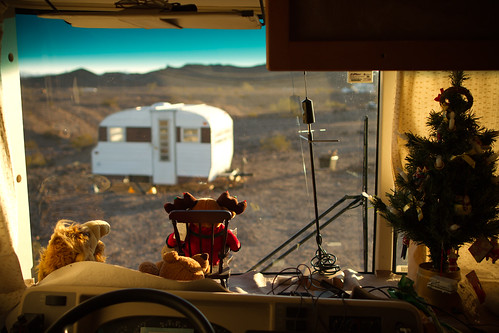
Snowbirding in the Arizona desert.
(*photo by Tim Milkmit, Creative Commons)
January 18, 2012 When is a
Seasonal Move (Snowbirding) Green?
We
may look out the window in a northern residence and wish we could be in Florida
to avoid the icy conditions just beyond the glass. Birds may fly, migrants
workers follow the harvesting periods, others simply stay at home with few
wishful thoughts of fleeing beyond their means. But some may give this wintry
escape ample thought, for it takes heat to warm a house in winter and cooling to
make one comfortable in summer. Aren't the migrating birds adhering to an
environmental or green mentality of avoiding the cold or the excessive heat?
Circumstances
vary with individuals. Access to two dwellings (one in the North and one in the
South) is simply not affordable for many. If this option is within one's means,
should not the amount of heat demanded by the dweller for comfort in winter be
considered? Should those who need 75 degree Fahrenheit room temperatures during
winter simply dress warmer and live more healthy lives? Do not more die in
summer from overheat than in winter from cold? Don't insulation and warm
clothes and bedding make a difference -- and allow winter weather to be
tolerated? Additional points worth a January reflection and questioning are:
Visitors for a short
time: People who can get away from winter to Florida and have relatives or
friends there are fortunate. That means cutting down Northern domestic heating
to a minimum temperature that keeps water pipes from freezing. Depending on
length of visit, the fuel for travel may equal the domestic space fuel savings.
Shouldn't we factor benefits of a rejuvenated spirit?
Northerners
with Florida connections: Amazingly, large numbers have relatives in the
south who even want those who suffer from winters to migrate south and live with
them during severe winter months. Where living congenially with extended
families is possible, closing down a winter house can be green, especially if
one calculates the cost of winter heating bills.
People
with two residences: This is problematic because house maintenance costs are
generally greater than heat saved in winter or cool air saved through residing
in the North in summer. Greenness depends on the size of residences. A summer
small cabin when closed in winter requires low maintenance.
Floridian escapees in
summer: This migration in the other direction (along with the semi-tropical
birds coming north) may involve greenness, if the migrants north have access to
a small summer cabin that requires little or no extra cooling. The space
savings often exceeds fuel costs of getting from place to place, especially if
one travels by train, bus, or even public airlines.
Prayer:
Lord, give us the stamina to endure winters, and if this proves too hard, allow
us the gift of welcoming warmer places and people with whom to visit and
reside.

Peanut butter, celery, and raisins - "ants on a log" - a treat!
(*photo by Brian Talbot, Creative Commons)
January 19, 2012 Peanuts:
Ecologically Green Food
Goodness how delicious,
eating goober peas. U.S. Southern Song
Peanut,
"groundnut," or "goober peas" have a long food and culinary history originating
in South America, spreading out to central America, and then to the world,
especially Asia and Africa. Amazingly, this proves to be a truly green food in
many ways:
Soil
improvement -- The leguminous peanut plant (Arachis hypogaea) bears
its fruit underground and not on nut trees. Peanut production was promoted in
our own South after the Civil War because cotton fields were prone to become
nitrogen depleted (and thus replenished by peanut crops). Today, the peanut is
regarded as a major U.S. and foreign crop, including in sub-Saharan Africa.
High
quality food -- The lowly peanut is high in protein as well as calories and
in antioxidants and other supplements -- this becomes a major item in prepared
quick foods for hungry children.
Popularity
-- In America, few food items are more popular than the peanut and its
derived "peanut butter," which when mixed with jelly becomes a favorite
children's treat. For food- conscious families, peanuts are relatively cheap
due to high global production volume (34.5 million metric tons per year).
Versatility
-- A national policy of peanut use developed in the early twentieth
century. George Washington Carver, a famous black American researcher, is
credited to have invented some 300 uses of peanuts -- though not peanut butter.
American stores sell many brands of peanut-containing candy bars and snack
foods, peanuts in cakes, cookies, peanut milk, and peanut oil, as well as fried
and boiled varieties of peanut specialties.
Adaptability
-- Peanut and other components of trail mixes are perfect for hiking and
exploration because high nutrition calories and protein are packed into quickly
edible (no fuel needed for cooking) materials. Don't forget that bears know a
good thing too and backpacks containing peanut materials must be safeguarded.
Economy
-- Prices of peanuts are rising but still far below the prices of other nut
products. I regard the peanut as a major food portion of my diet and include two
dozen oatmeal mixes with peanuts as well as a variety of salads containing the
nuts.
Not
Perfect -- While peanuts are popular, still 1-2% of people have some
allergic reactions to them, and a small portion of these can suffer
life-threatening anaphylactic shock from eating trace amounts and even processed
foods made from peanut-contaminated equipment. Worried parents demand peanut
labeling in such items as ice cream; they strive to get peanuts banned from
school menus and airline snacks. Many but not all peanut allergies can be
treated.
Prayer:
Lord, teach us to know good foods and to help promote these in a cost-conscious,
hungry, and starving world.

Public mural, Livingston, KY.
(*photo credit)
January 20, 2012 Ten
Eco-balances for an Earthhealer
The
admonition for doctors to heal themselves extends to all of us who seek to be
healers of this wounded world. We can only help reestablish eco-balance if we
harmonize our own lives:
*
Action and Reflection -- We work and we pause to reflect, and we need a
balance of both so we can live in harmony with our neighbors and with ourselves.
*
Prayer and Work -- We can hardly expect God to do miracles apart from our
efforts, for such is presumptuous. Godly work includes using our hands and feet
and brains and tongues.
*
Private and Public Prayer -- While praying in private in a room or the
great outdoors has its place, so does prayer with others in church, thus showing
that our own salvation is a community enterprise of the faithful.
*
Anger and Mercy -- The interior balance of being merciful to all others
and yet being angry about actions that hurt others must be part of a personal
but public ecological stance; this is in imitation of Jesus' own public life.
*
Exercise and Rest -- We are busy people and we need to relieve the normal
stresses of an active life, but that means we get necessary physical exercise
AND necessary sleep and rest.
*
Personal and Community Care -- We should not isolate ourselves but rather
make local interest and activity part of a healthy environment. We must always
reach out to those in need.
* Local and Global Action
-- Through faith we believe that what we do locally but in solidarity with
others in the world makes our actions global in scope (First Law of
Eco-dynamics).
*
Positive Activity and Suffering -- People are united in faith and
compassion with all who are willing to work and to suffer together in whatever
state they find themselves. No suffering is lost (Second Law of Eco-dynamics).
*
Acceptance and Confrontation -- If and when we are looked down upon
personally we may have to accept it. However, the oppressed of the world demand
our support and resulting confrontation in solidarity with all people of good
will contributing their talents (Third Law of Eco-dynamics).
*
Mortal and Eternal Life -- Every effort to repair our current world order
must be balanced by the need to help with the establishment of a future New
Heaven and New Earth -- action by which we help hasten the day of their coming
(II Peter).
Prayer:
Lord, please correct our many imbalances so we can become effective healers of
our wounded Earth.

Seed pods in the snow.
(*photo credit)
January 21, 2012 Should We
Use More Public Transportation?
On
the whole, once someone must travel, the mode of going from point A to Point B
becomes an ecological as well as convenience exercise. Are resources conserved
in the manner of the choice?
This travel question is posed as
a "we" instead of an "I" for several reasons: many of us have better access to
either private or public travel and so the aggregate is more important than the
specific individual practice.
If
we have access to a private vehicle we stress convenience, independence, and
other amenities that are accepted with little reflection. The private car means
so much to busy people. Generally, the public sector looms as just that -- a
public mingling with the crowds (when the solitary aspects of one's personal
vehicle runs deep with auto users). Again, trips involve private vehicles to
reach public places of departure or after arrival at the other end. Thus
attention must be paid to the mixed public and private modes, for in some
instances time and resources are saved by doing the entire trip by private
means.
The
specific rural travel has difficulties not experienced in urban life with
subways or airlines relatively close at hand. I am seventy-five miles from a
regular commercial airport and over one hundred from international airports,
with their considerable surface congestion and parking problems. Here the
mixed public/private considerations take on greater importance along with
extended travel time of departure, processing, waiting, arrival, and final
destination considerations. Passenger trains were quick inexpensive travel
modes our parents used in early 20th century, but now virtually non-existent in
rural America (though hopes spring eternal). Buses are more abundant but not
frequent and walking or biking are prohibitive beyond local areas.
The
question is more than academic: it involves time, energy, talent in some private
travel to travel hubs, expense, and physical limits. Some of us carpool with
those going to the same end point. Some of us can conduct business via phone,
email, postal letter, or even teleconferencing. Much can be done from a
distance without the physical travel, but not all. Personal contact is uniquely
valuable when someone needs genuine encouragement, when condolences must be made
in person, or when an initial gathering allows the participants to experience
another's presence even on singular occasions. Thus the basic consideration for
"necessary" travel is more fundamental than private versus public modes.
Longer-term
future travel is our focus here. In America we need public transportation
systems now available in Europe and becoming so in Asia. Building these
infrastructures takes public funding and a will to travel more ecologically. An
emphasis on public travel deserves tax-payer support even with limited funds.
Prayer:
Lord, we are on our journey of faith; help us to think as poor people when we
plan and make our travels in life.

A young Eastern cottontail, Sylvilagus floridanus.
(*photo credit)
January 22, 2012 Modern
Jonah: A Serious and Light-hearted Story
Up!
Go to Nineveh, the great city, and preach to them as I told you to. (Jonah
3:2)
We
are called to be modern "Jonah" prophets; Nineveh is the worldwide arena; going
out is engaging in the Internet through social networking with those in need;
and preaching is our interaction or our unique manner of responding to divine
inspiration, the Lord's call to each of us.
The basic Jonah story is
well known. Jonah is a reluctant prophet; he suffers from being disobedient in
his manner of responding to his mission; he is called to go to Nineveh, a vast
city, and yet he turns away and goes off to Tarshish -- the other end of the
Earth. This tale is an amusing story that in one sense seems quite farfetched.
Jonah finally listens to the call to convert Nineveh after being the victim of a
storm, thrown into the sea as though lost, rescued by a whale, regurgitated onto
the land, moves forward to his delayed mission, and after the mission is
accomplished complains even amid its success. God works with imperfect Jonahs
and accepts people where they are. Jonah's work is completed and yet he sits
outside the city depressed and awaiting death. A castor-oil plant (Ricinus
communis) grows up quickly and shades him; it dies and he faces the
scorching sun and again waits to die. God finally tells him one last time that
social concern of the people of Nineveh is what is important.
We are engaged each in our
own way in a Jonah Story:
*
We are also called by God each in our own way, for we each have a unique
mission;
* All too often we run from
that call in our own way, but God is the "Hound from Heaven" and seeks us out on
the fleeing ships of this world's busyness and cares;
* Misfortune strikes in the
storms of life and all seems lost in the manner in which we have forsaken our
mission;
*
Earthly creatures all too often are the messengers who are meant to bring us
back to our senses and to regain our mission;
* God's message is serious
even when accentuated through light-heartedness; we must return to our call to
save a wandering world, and preach the message of simpler lifestyle;
*
God's love and mercy extends to the brute animals, for these are included in
Nineveh's repentance and our wellbeing;
* The urgency of mission
grows as the agent of change becomes involved in the work at hand and demands a
change of heart;
*
We are but servants in the service of our God, and that should be its own
satisfaction;
*
At times we face depression and dissatisfaction; and
*
In humorous ways God blesses us with castor-oil plants.
Prayer:
Lord, help us to see our mission for what it is, to do so seriously and yet to
persist in a light-hearted fashion.

Reading an e-book by the fire.
(*photo credit)
January 23, 2012
Advantages of Electronic Books
During 2011, Earth Healing,
Inc. essentially moved from paper (3 printed books in 2010) to electronic books
(3 electronic books in 2011). We say "essentially" since we could furnish paper
versions of these upon demand, and as of this writing we have one possible paper
book being considered by a publisher. The record of paper publishing dropped
from three-quarters of the total two years ago to about one-half in 2011, a
national and worldwide phenomenon. A younger generation of readers is growing
up with a variety of electronic reading devices and tends to choose these for
many reasons. It is an older generation that holds back the near complete and
dramatic conversion to the benefits of electronics:
1.
Versatility -- Electronic books are easier to carry and store. Today one
can download hundreds of books or maybe an entire library on an electronic
device. These files can be easily transported from place to place in a highly
mobile society and especially when traveling away from home for periods of time.
2.
Economy -- Electronic books range from being free (our books) to low
prices, averaging about ten dollars each, while first runs from the paper press
can be three times that price.
3.
Accessibility -- Word searches and obtaining copies or scarce books are
far easier today than a few years back -- but this advantage also applies today
to many paper books as well.
4.
Ease in publication -- Do-it-yourselfers can present their works to wider
audiences at far lower cost, publishing time, and promotion than in times past.
Updates or second editions can be made at far lower cost and with greater ease.
Reproduction is only a matter of a small flick of a computer key as opposed to
slow and costly second paper editions over periods of time.
5.
Increasing Ease -- With each passing year new methods are unearthed to
make it still easier to electronically publish just about anything. This could
bear the disadvantage of having copyrighted materials stolen, and thus income
removed from legitimate authors and intellectual property holders.
Disadvantages
do exist. For one thing photographs are better presented in paper format as
many testify who receive copies of our Mountain Moments. The book
lover's "feel" of paper can never be substituted by the electronic version. The
art of browsing in libraries and bookstores loses the familiar touch through
lack of paper books. The ability to flag familiar books and make footnotes is
partly lost (but electronic books can be tagged for such purposes). Last of
all, the day of the beautiful book is fast ending as well as the day of the
comfortable bookstore, small or large. A half-of-a-millennia printed book era
is ending.
Prayer:
Lord, we are people of the book; help us honor this through spreading the Good
News using versatile electronic methods. 
Windbreak around buildings of Shaker Village of Pleasant Hill, KY.
(*photo credit)
January 24, 2012 Selecting Trees for
Windbreaks
We
are experiencing winter's blasts of wind at our residence, office, or gathering
place, and imagine or voice the observation, "This place needs a windbreak."
Obviously, we are not miracle workers getting wishes achieved in seconds. In
fact, planning, choosing species, planting, and patiently allowing trees to grow
take time. For a general background and planting technique on windbreaks see
December 11, 2008. So much depends on whether the property is rural or
urban, on the windswept plains or in partly protective hills, or whether singly
located or among artifacts.
Like
all trees, a number of windbreak specimens have advantages. Urban developers
talk about improvement of property value due to single tree additions (five or
more dollars rental per month per grown tree). Similar calculations of a
community of trees in a windbreak may prove just as eye-opening. Fuel economy
and beauty have often been noted as additional economic windbreak features.
Depending on specific location and climate, the Arbor Day Foundation's The
Treebook lists other general benefits performed by windbreaks: protecting
valuable topsoil, increasing crop yield, protecting livestock, reducing odors,
controlling snowdrifts, reducing noise, providing woody crops, adding wildlife
habitat, and providing more comfortable outdoor living space.
Windbreaks come in many designs and styles. A helpful and energy-saving idea is
to place low-growing evergreens close to the foundation of the building.
However, a windbreak pruned to allow air to flow through it would reduce this
insulating effect. By preventing wind from whipping around the foundation,
evergreen shields can create an air pocket close to the base of the structure.
In the winter time, these air pockets can sometimes be as much as ten degrees
warmer than the ambient outdoor temperature.
Windbreaks
can use a wide selection of tree species not all of which have to be native
varieties. Canadian hemlock, Colorado blue spruce, Norway spruce, and white
pines are often favorites. The Arbor Day Foundation sells to members the
American Arborvitae, Thuja occidentialis (used as a barrier at one of our
parish churches). Our Kentucky wild juniper we commonly call "cedar" is found
in all limestone locations -- and really can be a wind barrier especially in its
early years of life. Outside species such as the Austrian pine that can get to
be sixty feet tall and the Douglas fir that can reach one hundred feet are
commonly recommended for windbreaks. Many conifers may be chosen according to
access and through advice of local agricultural agents. Choices may be mixed
species; interspersing of two or so varieties ensures a good stand. Also
concentric rows of taller and shorter but fuller foliage or flowering varieties
may be selected. Giving advice from a distance is bad advice; so seek local
expertise but do consider the advantages of windbreaks in your neighborhood.
Prayer:
Lord, inspire us to make a better world, to use the wind and yet take our breaks
from it to the benefit of all.

Frank Lloyd Wrights simplified "Usonian" home, the Rosenbaum House. Florence,
AL.
(*photo credit)
January 25, 2012
Nine Reasons to Downsize Lifestyles
In
an economy-changing world we have constantly stressed the need for those who
live affluent or wasteful lives or "high on the hog" (ham and bacon in contrast
to pigs feet and snout) to consider living more simply. Most regard such
movement away from materialistic patterns of life and expectations as
countercultural and unworthy of perpetuation. However, a growing cadre of
people are turning their backs on upward mobility and are searching for reasons
to support their new resolve:
1.
Physical wellbeing is a major reason. Reduction in stress from jobs and
schedules of a busy lifestyle touches the health of partners and all family
members. Less stress means less high blood pressure, indigestion, and heart
problems.
2.
Religious motivation to live more simply includes a desire to live like
Christ and the saints, and to devote attention to the needs of others through
increased sensitivity and compassion.
3.
Less maintenance of expensive vehicles as well as larger space demands in
housing allows for more free time and less of the ongoing hassle in maintaining
complex lifestyles. This is a reason older people often choose to downsize
their residence size.
4.
Economics should never be overlooked, for affluent lifestyles require
more money; in turn, the downsizing person may discover that lower lifestyles
require less demanding jobs.
5.
Ecological aspects include use of less resources for travel, heating and
cooling space, and for producing and maintaining unneeded materials, and thus
less impact on Earth's resources and resulting pollution.
6.
Brighter outlooks on simpler things of life occur; one can better observe
nature and changes of the seasons. More quality time is available for outdoor
connections with flora and fauna.
7.
More time is available for family and interpersonal relations as well as
visiting and caring for those in need. The downsized position allows for
broader expansion to hobbies and non-work-related activities such as crafts.
8.
Social expansion occurs when we live more realistically. New friends are
discovered who are sympathetic to the needs of others, thus opening up an entire
new world of relationships.
9.
Exemplars are needed today to draw others away for upscale living
patterns. National wellbeing includes the contribution of individual downsizers
to the total health of a local and distant people everywhere, and to start a new
spiritual motivation.
Prayer:
Lord, teach us to see that by living more simply we are participating in the
coming of your Kingdom.
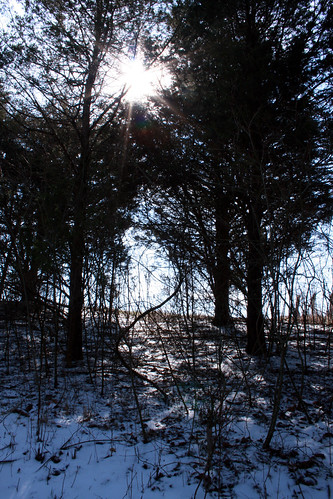
Sunlight to melt January snow.
(*photo credit)
January 26, 2012
Waiting Out the Snowstorm
The
likelihood is that if you are like me and reside in the northern temperate zone
you will experience one or more snowstorms this winter. The challenge to each
of us is to make the best of this situation. If away from our residence and out
in the elements this could be a medium to major problem, as would be necessary
home trips for treatments or reaching work places at times of storm.
Snow
is okay if we are prepared. Wherever we are located, it is important to
have plenty of basic energy-packed foods to last out any unexpected storm. Snug
dwellings are most welcome even though the snow covering acts as an insulation
to some degree. Warm layered clothing and bedding materials are just as
important.
Observing
snowfall is healing. Spend some time just looking out and watching the snow
falling. Yes, a barren and wounded landscape can become clothed in a protective
blanket of snow, and transform into a spectacular sight, especially at night
through reflected lights. Simply going outdoors and experiencing the snowfall
itself has its own healing effect. Harmony prevails. Landscape deserves its
rest and peace -- and snow honors such local vicinities.
Snow
offers moisture in a more gentle way than driving rain that can flood and
erode. Snow provides a pack that generally thaws over time and gives water for
natural flora, crops, and springs.
Snow
allows for primary reflection time. Hardly anything is more sacred than the
silence that comes with the cushioning of noise as snow is falling (howling
winds excepted). Tranquility becomes exquisite. The time of snowfall is a
period when we can let go of life's cares for at least a brief moment.
Snow
invites contact by us. Ever so briefly, snow is soft and fluffy. This is
all the more reason we ought to go and greet the incoming snow, allowing it to
touch our face and hands. Snowstorms offer the youthful, whether young or old,
a time to romp and play, or just to touch the coming flakes before a chill sets
in. I remember watching two grown men from tropical lands, who had never
experienced snow, run outdoors and roll in snow until they discovered after
initial exuberance that it was cold and wet.
Snow
is soothing. There is no greater experience of silence than the falling
snowflakes in the tranquility of a winter day. The touching of the leaves gives
just enough local noise to emphasize the deeper silence when all the ordinary
noises of the countryside are almost totally muffled. We experience nature in
the middle of its activity; we walk in a winter wonderland. For one brief
moment all nature seems to rejoice.
Prayer:
Lord, did you really create every snowflake with a different design? Will you
give us an eternity of delight?

Colorful scenes along a travel route. New Albany, IN.
(*photo credit)
January 27, 2012
Googling for Better or Worse
Few
words are so frequent in my current vocabulary than a recent one of the last
decade "to google," or to search for a word or phrase on the Google
search engine. I do this several times in an average workday and yet do not
ever recall being influenced by the side-bar advertisements, which keep the
company profitable.
Word-
and phrase-finding, checking and applications. Certainly time is saved in
not having to either hunt for a forgotten author, misspelled word, encyclopedic
fact, or quick introduction to an unknown subject. This comes in quite handy --
far more so than real puzzles that used to face some of us on varied issues. In
some way, without this service my work time would be extended. The speed of
response, provided enough key description is given, makes googling a time-saver
of the first order.
Moderate
researching. In the course of communicating we want to look up a current
personage, or song, or city, or hobby, and the first cut could be what is found
on the google site. However, we need to remember always that the politics of
placement makes the more popular site not necessarily the most authoritative.
Much is at the mercy of factors that many good researchers have not yet
discovered. Fact-checking by calling up multiple sources to cross reference
some issue is a helpful addition as well.
Traveling.
Another important googling service is that of Google's map information. For
almost any place near or far of which I do not know the exact route, the Google
travel mechanism assists mightily. What is such a godsend is that smaller
detailed maps allow one to run along the routes and find familiar junctions and
landmarks that simplify the trip immensely for those of us without automatic
map-finding devices. Google furnishes longer range maps of more extended road
trips with recommended routes and mileage so that trip planning is simplified.
In shorter ranging urban trips the actual route on the search map has photostats
with prominent landmarks needed for congested driving, though better if used by
a navigator.
Nothing
is perfect in this world, and one can see that googling leads to
dumbing-down research to some degree if we are not careful. It also gives wrong
emphasis if cross referencing is not undertaken. The operation takes less time
and the product is not perfect but considered satisfactory by some -- and this
could be a mistake. We need to spend more time that is gained in deeper
research and getting back to primary resource materials. Googling can lead us
to a superficial shallowness and failure to go more deeply into an issue that
needs our thorough attention.
Prayer:
Lord, our own imperfections stand out in the world of a multitude of information
and research. Help us to be on the alert for what is more accurate so that our
intellect will be sharpened in the complex world in which we live.
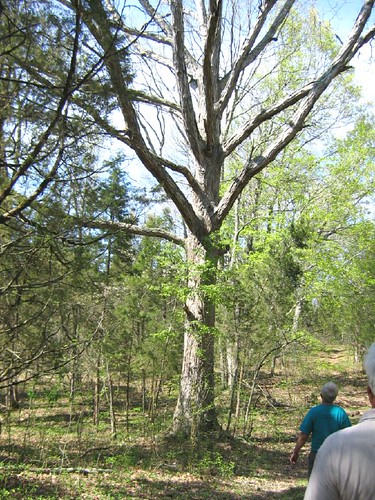
Two friends admire a graceful, old oak. Franklin Co., KY.
(*photo credit)
January 28, 2012 Quercus
Falls: Remembering Departed Human Oaks
One ever-lengthening list
for aging people is that of fallen friends, those "oaks" who seemed too strong
to ever fall and to have a streak of immortality. They are relatives and
friends new and old. This past year a former Jesuit who led the grounds crew in
cutting trees at the Milford Novitiate Farm succumbed after a gallant battle
with cancer. Jim Zeller was a true oak, and so I dug out my 1959 poem on
logging (from farm days before and after Jesuit entry) and rededicate it to him
and all fallen heroes.
Side note: The oak
that precipitated this poem was being cut by a handful of us and as it started
to fall they shouted "Al, its coming your way!" I didn't have time to look up
and step left or right to avoid the possible path, so I streaked straight away
from it and heard "faster, faster;" I was actually going in a direct line away
from the falling oak. Its top branches switched my tail. Some '59 humor and
laughs.
Quercus
Falls
Chips
like sparks, wood like steel,
A
two-man saw sounding an even squeal;
A
breath of fresh air, one more stroke
And
we'll bring to earth this princely oak.
Deep
in the lore of folk
One finds the
strength, age, and size of oak;
An out-worn saying
sums the three:
From the tiny acorn,
the mighty tree.
Few
greater sources of aesthetic joys,
Or Homer's concept
of battle noise,
Than a giant oak falling from a mountain crest
With a deafening
roar when it comes to rest.
Die
Alte Eiche, a Teutonic tale,
Of a proud tree's
thought that it was hale;
With an aged laugh
at a dancing day-fly,
And that stormy
night both chanced to die.
Power
the Romans admired at length
For their robur
meant both oak and strength.
What's a harder pull?
What's a tougher strain
Than pulling a saw
through this log's grain?
A
flash of lightning, a sound of thunder,
A trembling oak's a
mighty wonder.
Here's a
hundred-year history about to close.
Watch out boys! There she
goes!
Timber-r-r-r.
1959

Sharing kibbles with a friend.
(*photo credit)
January 29, 2012 When
Do We Teach with Authority?
And
his teaching made a deep impression on them because, unlike the scribes, he
taught them with authority. (Mark 1:22)
Jesus enters Capernaum and
teaches in the synagogue on the Sabbath. People have never heard one speak with
such authority, and are thus spellbound by his words -- and his healing deeds.
From the interaction with a man with an unclean spirit and the resulting healing
comes forth Jesus' reputation throughout the region.
Church
authority exists today. The power of the Risen Lord contains an authority that
extends in space and time in and through those who are his followers. Authority
stemming from conferred power rests in the Church itself and its structure that
endures down through the ages. That is a spiritual authority of leadership
within the Church herself and conferred to Peter and the Apostles and their
successors. In fact, included here is the permission to strive to drive out
unclean spirits (exorcism).
Today,
socially unclean spirits in the form of materialistic addictions abound in our
world, and we as baptized members of the Body of Christ must respond. God
bestows on each Christian through our Baptism/Confirmation a prophetic grace to
help save our wounded Earth and her people. We are baptized as priest, prophet,
and king; we are empowered with a certain authority when properly perceived and
exercised. In every age, Christians must rise to the problems facing a troubled
world, and our wounded Earth demands our response. Healing our Earth is a
mandate, the likes of which were never known before by any of our ancestors. We
cannot deny the situation, excuse ourselves, or seek to escape the demands
placed upon us. Like the event that Jesus experiences in the synagogue, we must
speak out and, like Jesus, join our words with deed.
The
challenge for us is to show authority without becoming authoritarian, for that
attitude undermines authority itself. We must address the addictions that beset
our consumer culture, but we address these with a godly act of love and mercy,
not in a self-righteous or vindictive manner. If our words show that we
understand the stance that we take and are willing and do act accordingly, then
greater authority follows.
All
too often the affluent move to tweak the system in such ways that they would
continue to hold to their ill-gained or retained power. This is not
sufficient. An Easter people must act differently. Like Jesus we must match
our speech with action, lest the words have a hollow sound; the two (word and
deed) must be in tandem. We are not to glory in the authority received in our
Baptism; rather this is God's authority shining through us and must be used with
respect. We are empowered through the power of the risen Lord, not through our
own efforts.
Prayer:
Lord, teach us to use the power given to spread the Good News for all to see
your authority shining through the combination of our words and deeds.
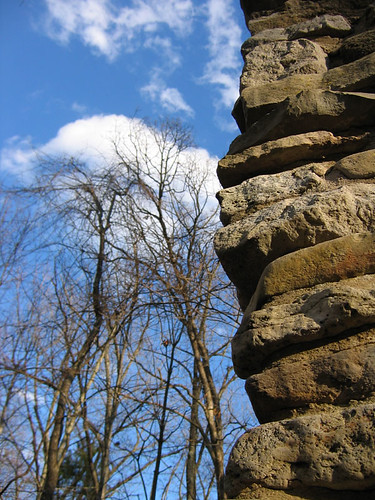
Stonework at Cedars of Lebanon State Park, TN, a WPA project.
(*photo credit)
January 30, 2012
Franklin D. Roosevelt and Jobs, Jobs
The
legacy of FDR, whose 130th birthday is today, is multifaceted: leadership during
the Great Depression and the Second World War, the Works Progress
Administration, Social Security, the "four freedoms," aid to Britain, and
others. We will focus on just one of the rights that FDR championed late in his
long presidential career, namely the right to employment. During the Great
Depression FDR noticed how many unemployed people were willing to work and
regarded this ability as part of human dignity. That right to life through work
is part of the very citizenship of each American, and for that matter people in
every land. It seems so evident and yet is put on the back burner, as though
the chance to work is in whom you know and the luck of the draw and talents
expressed in interviews. For those content with the status quo, food stamps for
the unemployed is sufficient. FDR knew otherwise and among the things he hoped
to achieve after the war's end was to focus on this and other basic rights of
American citizens.
If
we affirm this right to employment in its entirety (as stated several times
elsewhere on this website), we affirm as well the duties of the worker. Does
unemployment exist today? Certainly! About 9% of our citizens have no jobs as
of this moment, and this does not include those who have quit looking. Is there
possible work for all? Certainly! Within a host of areas from repair of
infrastructure and health services to home care for the infirm and literacy
training for the illiterate. But who would pay for these? Here, there is less
certainty. If we expect the illiterate or the infirm to do so, we are sadly
mistaken. However, more than enough funds exist among that proverbial 1% most
wealthy to satisfy all the needs for jobs, if this nation has the willingness to
tax the billionaires for the funds to put employment programs into action.
FDR
would have sympathized with today's Wall Street critics. Who are allowing all
to tolerate the unemployed condition of our people other than the excessively
wealthy and those they support and hire to do their bidding? That raises a
basic question: is not social justice served best by championing a government of
last resort, an agency that furnishes employment for every working person?
Certainly some jobs are to be filled in the private sector as it recovers from
the Great Recession.
We
cannot wait until everyone finds a job, for that puts an impossible burden on
the unemployed. For workers, food stamps and other benefits should be included
in the welfare job that all should be able to undertake. The securing of work
opportunities is ultimately a governmental duty that is part of the
constitutionally guaranteed life, liberty and pursuit of happiness. Do our
citizens understand what FDR saw so clearly at his death in 1945? This must be
emphasized with ever increasing vigor today.
Prayer:
Lord, help us to be angered that our people do not see the need to overcome
unemployment as an urgent civic matter.
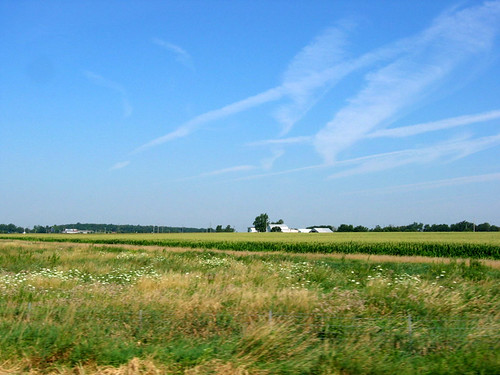
Scene from rural southeastern Ohio.
(*photo credit)
January 31, 2012
Encouraging Reclaimers of the Commons
Some
have suggested that we ought to highlight individuals who are deserving of the
title "reclaimers of the commons." However, tagging such individuals seems
wrong. For instance, we are impressed that Jim Koch, founder of Boston Beer,
gives grants to beginning financially-strapped entrepreneurs -- even beer
crafters who would be competitive with their product. Certainly a noble
practice! However, my niece, Annette, who works with Jim gave a thumbs up, but
the fact he is a multimillionaire in wealthy Boston causes some of us to pause.
Are authentic reclaimers individuals (even talented agents of change) or are
they groups working together in achieving the commons as a goal?
The
fact is that reclaiming the commons has hardly begun as a process; to award
individuals or groups at this time seems horribly premature. No one stood on
the sands of Dunkirk in 1940 during the evacuation of the British Expeditionary
Force and handed out metals for heroism, even when performed. We are standing
on today's Dunkirk and have much work to do to save this threatened world. It
is not time to give awards to any, for the call is not to single individuals out
for heroism but to redouble the efforts to get all involved in work of a
non-spectacular nature. The commons are meant for commoners and not the elite,
no matter how brilliant and innovative they are. The ones who camp out against
Wall Street and call for reform of a dysfunctional economic system are more
worthy of praise than the ones who reach out above the herd for special
mention.
The
commons are for and through commoners, and they are worthy of praise even if it
must be postponed until a later date. Rather, a different approach to
encouragement for individual reclaimers is to discover encouraging opportunities
and make the best of them:
*
Keep eyes peeled for those hidden ones who do godly work and yet go unnoticed by
the world around them. Be first to discover and meet with them and say kind
words of encouragement;
*
Listen to reclaiming people and know what they are doing, for, without hearing
their stories, one could not tune in and show that the solidarity is present;
* Give moral and spiritual
support where possible, for no one is able to act totally alone or in small
groups without seeing that the broader group is behind them;
*
Show that each contribution can be (if done in love) of immense value and worthy
of wholehearted support;
*
Spread the word of the success in little ways so the story can be better
understood by all.
Prayer:
Lord, help us to seek and find the groups who need our encouragement and then to
give it generously. |